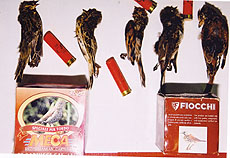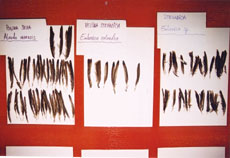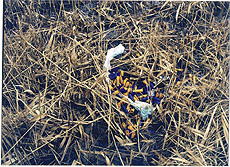 |
| The ecological crime has too often been interpreted as „diversification of the tourist industry portfolio” |
Birds have since time immemorial inspired artists, but they have at the same
time been hunted for food. Another sad motive for hunting them has recently emerged:
that of making a quick buck.
Recent evidence of bird-hunting to make big money in a short time involves a massive
scandal that broke out when the Italian police, more than a year ago, seized a
trailer carrying 12 tons of deep-frozen birds. The 120,700 dead birds belonged
to 83 species and originated mainly from Vojvodina, in the north of Serbia.
Among the illegally shot birds, 68 species were under permanent hunting prohibition,
33 were very rare species, while the rest represented various protected species
of singing birds.
Most of the birds were killed in Vojvodina – in western and northern Backa,
central and northern Banat, in the areas around Subotica, Sombor, Zrenjanin, Bac
and other settlements, many of which are located in the vicinity of wild bird
habitats protected by international laws (IBA sites).
 |
| Casualties of a „nature lover’s“ cruel hobby |
The birds were hunted in the open, in the meadows, near marshes and canals.
The hunters used 15-20-meter shotguns with birdshot. The birds were attracted
by recorded sounds, which is a prohibited activity, while others were caught alive
by nets.
The biggest casualties involved meadow and tree pipit, sky lark and singing birds
under permanent hunting prohibition, as well as common quail and turtle dove,
wild birds for which – contrary to many European countries – there is
a hunting season in Vojvodina. The hunters also shot down different species of
wild ducks, gray partridge, shrike and reed bunting, which are very rare.
Four Italians and one citizen of Serbia were arrested in "The Balkan Birds”
scandal. Two of the Italians were co-owners of two travel agencies that used to
bring foreign hunters to Serbia.
The hunters’ associations from Vojvodina kept quiet, being allegedly "uninformed”
on the fate of the protected birds. Having financial gain in sight, they allowed
– on their own hunting grounds – a "collateral” hunt of numerous
species of singing birds. The small birds were served to gourmands in Italy, until
the illegal trade was stopped. However, for lack of evidence, the majority of
the culprits have never been caught.
 |
| Faced with 15-20-meter shotguns the birds stood no chance at all |
This ecological crime went on for several years before it was discovered, and
there are indications that similar cargos of dead birds came from other Eastern
European countries, where such a hunt was sometimes regarded as part of a "diversified
tourist portfolio”.
Since "The Balkan Birds” case triggered strong public reaction in Serbia,
no massive poaching has been reported in the past autumn and winter months, but
there have been several complaints by eyewitnesses reporting violations of the
law such as the use of sound recordings to attract birds. Judicial procedure was
launched in those cases, but there have been clear indications that the poaching
of singing birds has moved over to the neighboring Sava region in Bosnia..
Poor environmental awareness and greed for money are warning signs that "The
Balkan Birds” story could be repeated. There is no appropriate control in
the field; fines for violation of the law are rather low and customs officers
are not sufficiently trained to identify ecological crime.
In response to the proposals made by the Serbian Institute for the Protection
of Nature and the Serbian Environment Ministry, new regulations have been adopted
aimed at protecting all singing bird species from being illegally hunted. Apart
from that, modified regulations on the protection of rare species, which envisage
more severe fines, are being prepared. The regulations will be aligned with the
corresponding international laws and regulations.
There are about 380 bird species in Serbia, of which 255 are very rare. That is
why it is of utmost importance to make efforts and implement – to a much
greater extent than has been the case until now – both local regulations
and international conventions on the protection of biodiversity, the Bonn, Bern
and CITES conventions.
The preservation of natural habitat diversity is an imperative because it forms
the ecological basis for the survival of both animal and human life.